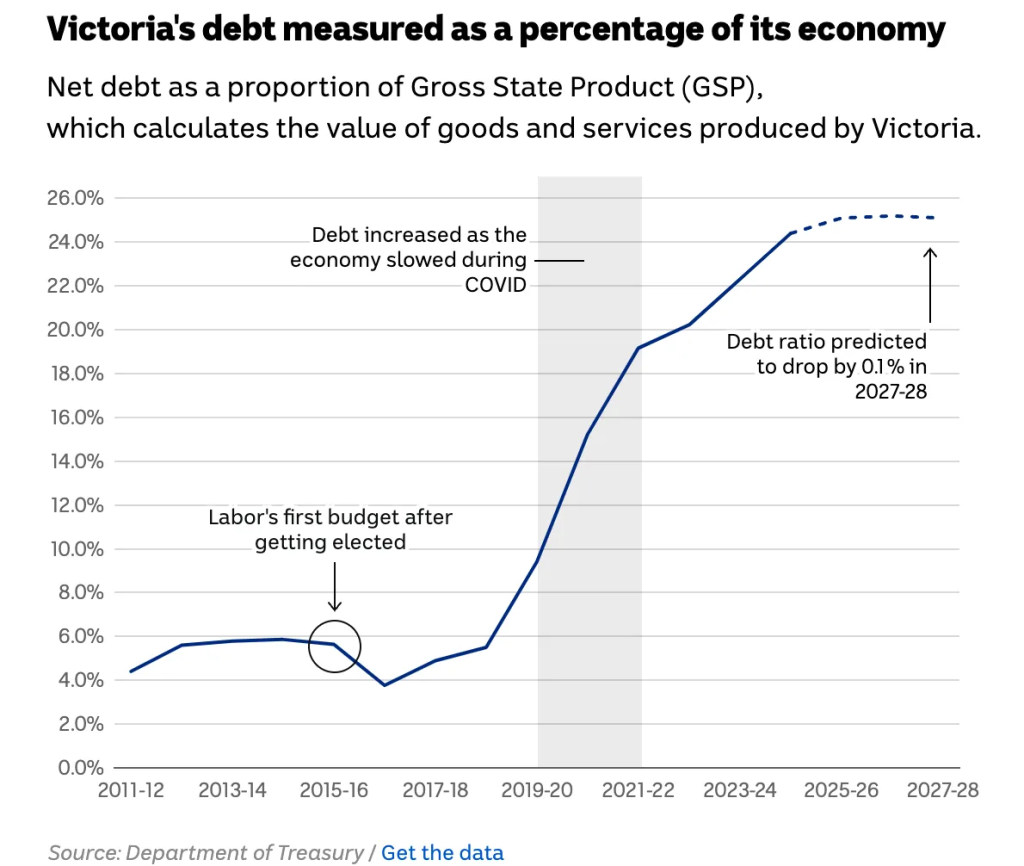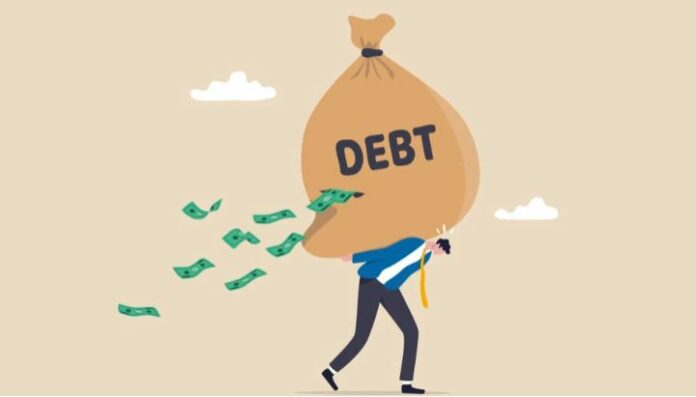Rebekah Barnett
The most locked down state in the world is spending $26 million a day – $9.4 billion a year – on interest alone to service lockdown-driven debt
A leading credit rating agency has blamed the Andrews Government’s prolonged lockdowns for Victoria’s ballooning debt, as the state stares down the prospect of a credit rating downgrade within the next year.
Victoria’s capital, Melbourne, had the longest lockdowns in the world – six lockdowns with a cumulative total of 262 days throughout 2020 and 2021, during which time many businesses were shuttered while workers lived off benefits.
Anthony Walker, director in the sovereign ratings team at S&P Global Ratings, said that only five or six years ago, “Victoria had the best financial outcomes” in Australia, but that the Andrews Government’s lockdowns had created fiscal conditions that Walker described matter-of-factly as “not positive.”
“Definitely the prolonged lockdowns and the number of lockdowns during Covid were the key that drove this,” Walker told Tom Elliot on 3AW radio.
“What we’re seeing now is that most other states around the world have recovered from Covid financially. Australian states, not just Victoria, are lagging.
“Our understanding was that the government didn’t really care about the financial, economic costs.
“They just wanted to get the health outcomes correct. Well, that came at a massive fiscal shock, and they’re still trying to recover from that.”
Walker said that “very difficult decisions need to be made” about government spending going forward, as a looming credit rating downgrade would direct more state funds towards paying off higher interest fees on debt, potentially sending social welfare programs or infrastructure projects to the chopping block.
Walker’s comments come as Victoria is currently paying $26 million dollars a day – $9.4 billion per year – on interest repayments towards the state’s $156.2 billion debt, projected to rise to $187.8 billion by 2027-28, for a population of approximately seven million. Victoria’s net debt is projected to be 24.4% of gross state product (GSP, which calculates the value of goods and services produced by the state) by June 2025.
Walker said that budget blow outs and funding shortfalls on several large infrastructure projects could create further downward pressure on Victoria’s credit rating.
The Airport Rail Link is projected to blow out by $2 billion due to delays, and the Metro Tunnel project has been beset by problems contributing to around $3 billion in added costs. A third project, the Suburban Rail Loop, is facing a $20 billion funding gap.
Victoria’s credit rating was already dropped by two levels – from AAA to AA – in 2020, a move that Walker said had never been done before for a state government.

Economist: ‘Worst peace-time policy failure’
Professor Gigi Foster, an economist at the University of New South Wales (UNSW) said it was clear since as early as March 2020 that Victoria’s lockdowns would carry enormous economic costs.
“I am sorry to say that I stand by my predictions that Covid lockdowns will go down eventually as the worst peace-time policy failure in Australia’s history,” Foster told me.
“There is no world in which forcing an economy to pause indefinitely carries no cost, because economic activity is the engine that powers the maintenance and gradual rise of human living standards.”
Foster cautioned a Victorian Government committee in August 2020 that continued lockdowns would cause greater loss of life years and wellbeing than they would save, but “sadly, my warnings went unheeded.”
Instead, Foster was singled out for abuse for highlighting the potential harms of Victoria’s extreme lockdown policies.
“I was pilloried by others in my profession, called many derogatory names by dozens of people over email, on social media, and in studio audiences, and told many times that my professional opinion about lockdown policies was of no value (or was even “dangerous to public health”) because I was not a health practitioner or epidemiologist,” she said.
Foster’s analysis of the societal, economic and health merits of Victoria’s Covid lockdowns found that the costs were 68 times greater than any benefits afforded.
Foster has also co-authored a book-length cost-benefit analysis of Victoria’s lockdowns with ex-Victorian Treasury economist Sanjeev Sabhlok, and a peer-reviewed paper with economist Paul Frijters in which the authors conclude that Australia’s lockdowns were “a disproportionate and largely ineffective policy response” to Covid, which went against decades of scientific consensus.

Epidemiologist: ‘Harm the economy, harm human health’
Stanford University epidemiologist Professor Jay Bhattacharya also faced blowback for his warnings about the harms of lockdowns, being targeted by the National Institutes of Health (NIH) Director Francis Collins for a “quick and devastating published take down” of his views, and being censored by social media platforms under pressure from the Biden Administration.1
Bhattacharya told me that criticisms of lockdowns were wrongly seen in terms of a trade-off between saving lives and protecting the economy.
“In fact, there was no trade-off as the lockdowns did not ultimately protect human life, and they devastated the economies of the countries that most assiduously implemented them,” he said.
“A second related fallacy is the idea that economic harm does not translate to harm to human health. The opposite is true.
“Poorer populations lead shorter, less healthy lives. Accounting for economic harm should be a vital part of public health thinking, even during a pandemic, if human life is to be preserved.”
In October 2020, Bhattacharya co-authored the Great Barrington Declaration with epidemiologists Martin Kulldorff (Harvard) and Sunetra Gupta (Oxford), calling for ‘focused protection’ of the most vulnerable instead of wholesale lockdowns. This approach is now widely agreed to be the least damaging and the most effective.
But Bhattacharya said that Australian media, with the exception of Spectator and Outsiders on Sky News, were “quite hostile” to this idea during the peak days of the pandemic in 2020-2022.
“The point of view adopted by much of the Australian press seemed to be that zero Covid was a permanent achievable goal, with no regard for the ultimate futility of the strategy and the harms to health and welfare imposed on the Australian population by the policy.”
Victorian Government: ‘Economic growth is what matters’
A spokesperson for the Victorian Government said,
“At the height of the pandemic we used our balance sheet to protect families and businesses, savings jobs and saving lives, and since September 2020 we have led the nation in jobs growth.
“Our fiscal strategy is strengthening the economy and providing opportunities for Victorians, with more jobs created in Victoria than any other state since we came to government.
“Deloitte Access Economics data forecasts that Victoria will lead the nation in economic growth over the next five years.”
The spokesperson added that the Victorian Budget 2024/25 is “the first time net debt to GSP has dropped since 2017.”
Foster is sceptical. “If you actively damage the economy, lowering the baseline of activity and jobs, then it’s a lot easier to create growth in both from that lower baseline and then crow about it,” she said.
Former Premier Dan Andrews, who was responsible for Victoria’s Covid lockdowns, has not publicly commented on Walker’s statements blaming his policies for the state’s dire debt situation.
However, when previously challenged on his draconian Covid policies, Andrews has tended towards defending his record, highlighting that he was re-elected in 2022 after the worst of the lockdowns, and refusing to “apologise for saving lives.”
Nearly three quarters of Victorians supported the Andrews Government’s extreme measures in the first year of the pandemic, polling shows.
This year, Andrews was awarded Australia’s top honour, in part for “eminent service to public health.”
Looking ahead
Foster said she is concerned that Victoria’s debt woes are “only the tip of the iceberg.”
“Far more negative effects on Australia’s health, wealth, and happiness will be seen in the coming years stemming directly from our colossal mismanagement of the Covid era.”
But it’s not all bad news – there are things that can be done to improve the situation, said Foster.
“The government should significantly reduce its own numbers and its own pay checks, reduce red tape in industries across the board, refocus on its core mission of providing high-quality, easily accessible basic services and public goods to all Victorians, [and] open all state affairs to public scrutiny.”
The government should also set up a process to “manage the acknowledgement of betrayal, hearing of pain, apologies, trials, and other components the people of the state will need to heal” from pandemic mismanagement, she said.
With the Covid pandemic in the rearview mirror, much of the focus is now on lessons learned.
Asked what we can learn from Victoria’s pandemic management, and lockdowns in particular, Bhattacharya is frank.
“Victoria is an example of how not to handle a pandemic. Authoritarian government is bad public health policy.”
This article was first published at Dystopian Down Under and Richardson Post.







